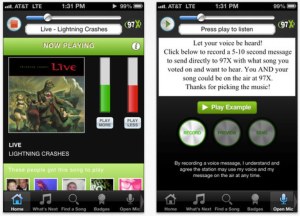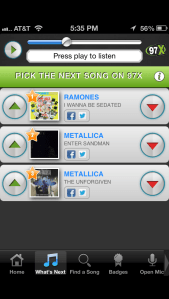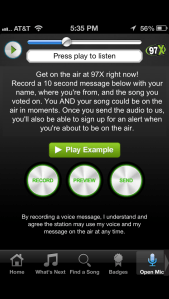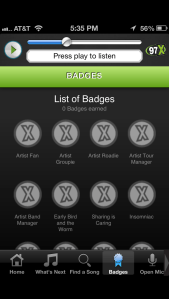-
 Find in Profile
Find in Profile Find in Store Products
Find in Store Products Find in Directory Pages
Find in Directory Pages Find in Classifieds
Find in Classifieds Find in Stores
Find in Stores
- Sign In
- Create Account
Enter Details to Login
Not a Member? Join- Don't have an account? Sign Up
- Already a member? Sign In






Today, a Cox Media-owned radio station in Florida’s Tampa Bay is shifting its entire format to listener-controlled radio, now putting its audience in control of the songs that play 24 hours a day. It’s the first station among Cox Media’s 86 U.S.-based properties to do so on both web and mobile, if not the first in the U.S. to experiment with the format. Is this what the future of terrestrial radio looks like? It just might be.
What the future of radio looks like is a question that radio stations everywhere – and not just here in the U.S. – are struggling with. After all, what hope does radio have when anyone can play any music, on-demand, any time they want?
The answer, as it turns out, may be to mimic those services their listeners are abandoning them for, and then attempt to add value.
That’s certainly the case with Cox Media Group’s 97x, which today at 5 PM ET, is making an extreme shift to user-controlled programming for the first time. The station had been building its new platform in stealth, in partnership with LDR Interactive (aka “Listener Driven Radio”) which today offers “crowdcasting” solutions for 160 stations worldwide. Its services range from simple music research (users voting for favorite songs) to full-on listener takeover of the radio station’s queue.
Most of these crowd-controlled stations are experimenting with the technology, however, offering users the ability to vote on a song or control a short block of programming. They aren’t turning the entire station over to the listener base. But perhaps they should.
 In the first four hours of teasing its launch, 97x received 31,000 song votes. To give you an idea, the station, in a typical week, usually has around 300,000 people tuning in. Assuming traction continues at this pace, it could translate into a massive leap in listeners.
In the first four hours of teasing its launch, 97x received 31,000 song votes. To give you an idea, the station, in a typical week, usually has around 300,000 people tuning in. Assuming traction continues at this pace, it could translate into a massive leap in listeners.
The Tampa station is only the second among LDR’s partners to try such a thing. The first, an urban radio station in Ft. Wayne, Ind., went to 24/7 user-controlled programming, and then rocketed itself up from No. 20 in its market to No. 1 over the course of a year. But in that instance, the listeners had to go to a website to make their selections. Tampa’s 97x rollout includes both an iOS and Android applications, and several innovative features which make it unique.
I spoke with Keith Lawless, VP and Market Manager for Cox Media, about what makes this particular station’s approach so different. “Listeners don’t just control the music,” he told me, “they’re actually on the air.” The apps, he explains, include an “Open Mic” feature, which lets users record a 10-second introduction, dedication, song request, or whatever else they want to say, using their smartphone. The audio clip is then sent to the studio, where the DJs (who are now rebranded as “music guides”) play it in conjunction with whatever song clip it’s referencing or in another timeslot that makes sense.
 These DJs, or guides if you will, aren’t completely out of a job with the listener takeover, you’ll be glad to know. They’ll still vet those audio clips, of course, fill the queue with new music, and they still have some say over what goes on the air. That is, it has to match the station’s format. “You may suggest ‘Justin Bieber’ and I’m not going to put it in there because it’s not that kind of station,” Lawless jokes. But, he also says that the station is no longer limited to its playlist in terms of what’s going on the air.
These DJs, or guides if you will, aren’t completely out of a job with the listener takeover, you’ll be glad to know. They’ll still vet those audio clips, of course, fill the queue with new music, and they still have some say over what goes on the air. That is, it has to match the station’s format. “You may suggest ‘Justin Bieber’ and I’m not going to put it in there because it’s not that kind of station,” Lawless jokes. But, he also says that the station is no longer limited to its playlist in terms of what’s going on the air.
In the case of 97x, it already had a larger selection (250 songs) on its playlist, compared to the 100 songs that a contemporary-hits station generally plays, but with the user-control takeover, that playlist expands to 1,800. And users can even request songs outside the list if they want. “You may come up with a deep cut from an artist like Red Hot Chili Peppers, and we go ‘wow, we’ve had a couple of requests for that, let’s put that in the queue and see if people start voting for it,’” says Lawless.
Not only does the new platform introduce the user audio recordings feature, it’s also now meeting with local businesses to sponsor its “rewards” platform. To encourage user engagement, the station doles out its own badges for participation. For example, the “Early Bird and the Worm” badge (referencing a song by The Used), might offer those who voted between 4 AM and 6 AM a free coffee at Dunkin’ Donuts.
 To some extent, this type of carrot-and-stick system might be needed in order to keep users engaged. No other LDR partner station has attempted this on mobile, and only one has tried the 24/7 format. “It’s important that the votes continue along the way…we have to keep it fresh,” Lawless says. “We can’t have app fatigue. Everyone’s had that app they loved so much, and then two months later they delete it out,” he worries.
To some extent, this type of carrot-and-stick system might be needed in order to keep users engaged. No other LDR partner station has attempted this on mobile, and only one has tried the 24/7 format. “It’s important that the votes continue along the way…we have to keep it fresh,” Lawless says. “We can’t have app fatigue. Everyone’s had that app they loved so much, and then two months later they delete it out,” he worries.
To keep things interesting, the apps also use notifications to alert users when their audio recordings will play on-air, or when their favorite track or artist is about to play. Users can request to be alerted through SMS, email or even Twitter. And they can share their recordings, badges, votes and favorites songs on Facebook and Twitter, too.
Lawless says that Tampa’s 12-year old station 97x was a candidate for this radical change because its Arbitron ratings weren’t doing that well, despite the fact that other efforts, such as its popular concert series “The Next Big Thing,” have drawn large crowds. Last year’s event was even the biggest one to date, he noted.
Given the target audience here – young alt rock listeners – a station like 97x could almost be the canary in the coal mine, in terms of what’s happening to radio. The younger users just aren’t listening like they used to. Maybe putting them in charge will bring them back.
The radio industry, like so many others, has been slow to adapt to the disruption of the always-on broadband age and the widespread adoption of mobile devices that allow users to download an app that plays whatever music they want and, for a small fee, hear that music without any ads - Spotify (Premium), for example. To combat this trend, Clear Channel, which operates over 1,200 radio stations across the U.S., has copied – sometimes, almost shamelessly – the innovations from streaming music startups, which it offers in its iHeartRadio mobile application.
But while Clear Channel is trying to blend the modern music streaming experience with traditional “live radio” on mobile, other companies have attacked the problem differently. For example, Jelli, a crowdsourced social radio platform, which this fall received an additional $9 million in venture funding, has been trying a similar model to LDR’s in that it, too, brings crowd control to terrestrial radio.
Today, Jelli has expanded its user-control platform to 70 radio stations across the U.S. Some of its stations, too, have launched a 24-hour user-controlled format, says Jelli CEO Michael Dougherty. “Imitation is the best form of flattery,” he says of the Cox Media-owned 97x’s recent shift. “[I] would love more stations to do this,” he tells me. “I think it is very important for radio to leverage its strengths, including local community, group listening and a ‘social DNA’ which can be amplified by platforms like Jelli.”
Initially, LDR’s platform and Jelli seem a lot alike, but Victor Caballero, VP of Operations at LDR, says the two models are actually quite different.
“We both entered the space around the same time,” he says. “Jelli is more concerned about getting their brand out in the marketplace, and we’re not…we’re designed to help our affiliates own their interactive platform, and brand it however they want to,” Caballero adds. That is, unlike Jelli, where users download a Jelli-branded mobile app and then pick their local station, LDR’s customers use the technology in their own self-branded apps and websites.
And so while there have been a few 24/7 stations out there, such as those on Jelli, there hasn’t yet been one that has done it exactly like this. Not only is 97x doing this under its own branding, it’s doing it on mobile, with social media integration, “open mic” recordings, notifications, badges and rewards.
“I haven’t seen any station launch it on this level, with the app, with the marketing, in a market this size, with a station this big,” says Caballero. “When you gather everything that comes together with this particular launch, it’s one of a kind in the world.”
Note: This is a demo site. The content above has been taken from: http://techcrunch.com/2013/01/18/radio-freaks-out-first-cox-media-owned-radio-station-turns-over-control-to-listeners-247/
 |
 |
 |
 |


7 Comments